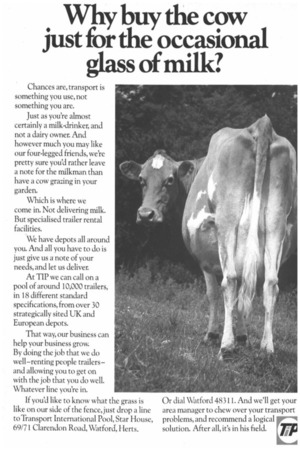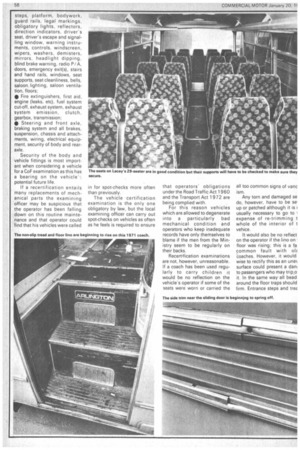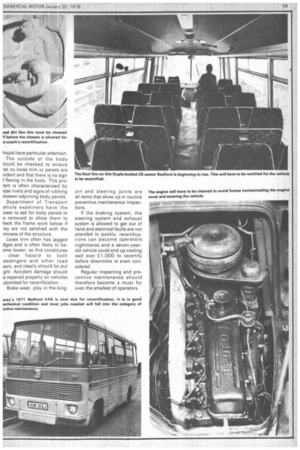Why buy the cow just for the occasional glass of milk?
Page 58

Page 60

Page 61

If you've noticed an error in this article please click here to report it so we can fix it.
steps, platform, bodywork, guard rails, legal markings. obligatory lights, reflectors, direction indicators, driver's seat, driver's escape and signalling window, warning instruments, controls, windscreen, wipers, washers, demisters, mirrors, headlight dipping, blind brake warning, radio P/A, doors, emergency exit(s), stairs and hand rails, windows, seat supports, seat cleanliness, bells, saloon lighting, saloon ventilation, floors; • Fire extinguishers, first aid, engine (leaks, etc), fuel system cut-off, exhaust system, exhaust system emission, clutch, gearbox, transmission; • Steering and front axle, braking system and all brakes, suspension, chassis and attachments, wiring, electrical equipment, security of body and rearaxle.
Security of the body and vehicle fittings is most important when considering a vehicle for a CoF examination as this has a bearing on the vehicle"-, potential future life.
If a recertification entails many replacements of mechanical parts the examining officer may be suspicious that the operator has been falling down on this routine maintenance and that operator could find that his vehicles were called in for spot-checks more often than previously.
The vehicle certification examination is the only one obligatory by law, but the local examining officer can carry out spot-checks on vehicles as often as he feels is required to ensure that operators' obligations under the Road Traffic Act 1960 and the Transport Act 1972 are being complied with For this reason vehicles which are allowed to degenerate into a particularly bad mechanical condition and operators who keep inadequate records have only themselves to blame if the men from the Ministry seem to be regularly on their backs.
Recertification examinations are not, however, unreasonable. If a coach has been used regularly to carry children it would be no reflection on the vehicle's operator if some of the seats were worn or carried the all too common signs of vanc ism.
Any torn and damaged se do, however, have to be se up or patched although it is usually necessary to go to I expense of re-trimming t whole of the interior of t vehice.
It would also be no reflect on the operator if the lino on • floor was rising; this is a fa common fault with olc coaches. However, it would wise to rectify this as an une‘ surface could present a clan! to passengers who may trip a' it. In the same way all bead around the floor traps should firm. Entrance steps and treE hould have particular attention. The outside of the body hould be checked to ensure at no loose trim or panels are vident and that there is no sign I flexing in the body. This prolem is often characterised by )ose rivets and signs of rubbing etween adjoining body panels. Department of Transport ehicle examiners have the ower to ask for body panels to .e removed to allow them to heck the frame work belcw if ley are not satisfied with the rrnness of the structure.
Loose trim often has jagged dges and is often likely to beome looser; so this constitutes
clear hazard to both ,assengers and other road sers, and clearly should be put ight. Accident damage should le repaired properly on vehicles ubmitted for recertification.
Brake wear, play in the king
pin and steering joints are The engine will have to be cleaned to avoid fumes contaminating the engine all items that show up in routine cover and entering the vehicle.
preventive maintenance inspections.
If the braking system, the steering system and exhaust system is allowed to get out of hand and electrical faults are not attended to quickly, recertifications can become operators nightmares and a seven-yearold vehicle could end up costing well over £1000 to recertify before downtime is even considered.
Regular inspecting and preventive maintenance should therefore become a must for even the smallest of operators.
















































































































